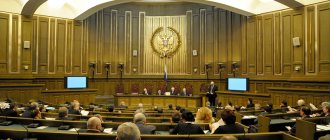Thus, the methods of stealing someone else’s property or acquiring the right to someone else’s property during fraud, liability for which arises in accordance with Articles 158.1, 159, 159.1, 159.2, 159.3, 159.5 of the Criminal Code of the Russian Federation, are deception or abuse of trust, under the influence of which the owner of the property or other a person transfers property or the right to it to another person or does not interfere with the seizure of this property or the acquisition of the right to it by another person.
Deception as a method of committing theft or acquiring the right to someone else’s property may consist of deliberate communication (presentation) of knowingly false information that does not correspond to reality, or in silence about true facts, or in deliberate actions (for example, in the provision of counterfeit goods or other subject of a transaction, the use of various deceptive techniques when paying for goods or services or when playing gambling, simulating cash transactions, etc.) aimed at misleading the owner of the property or another person.
The elements of fraud (Article 159 of the Criminal Code of the Russian Federation) will occur if the attacker receives someone else's money or property without intending to fulfill the obligations associated with the terms of transfer of this money and property to him. In this case, the intent to steal funds and property must arise on the part of the person even before receiving them. The presence of such intent may be evidenced, in particular, by the person’s lack of a real opportunity to fulfill the obligation, the use of forged documents, and others.
It is explained what should be understood by misappropriation and embezzlement (Article 160 of the Criminal Code of the Russian Federation).
Appropriation consists of the gratuitous, mercenary, unlawful use by a person of the property entrusted to him for his own benefit against the will of the owner. Misappropriation is considered a completed crime from the moment when the legal possession of the property entrusted to a person became illegal and this person began to take actions aimed at converting the said property to his own benefit (for example, from the moment when a person, through forgery, conceals the presence of entrusted property in his possession, or with the moment of failure to fulfill the obligation of a person to place funds entrusted to this person into the bank account of the owner), and embezzlement - when the illegal actions of a person who, for personal gain, spent the property entrusted to him against the will of the owner by consuming this property, spending it or transferring it to other persons.
The clarifications also touched upon the distinction between crimes and administrative offenses in the theft of property.
Thus, the Supreme Court of the Russian Federation recalled that according to current legislation, fraud, misappropriation or embezzlement in the amount of up to 2.5 thousand rubles. is “petty theft” - Art. 7.27 Code of Administrative Offences.
When determining the value of property stolen as a result of fraud, misappropriation or embezzlement, one should proceed from its actual value at the time the crime was committed. If there is no information about the value of the stolen property, it can be established on the basis of the opinion of a specialist or expert.
When establishing the amount stolen as a result of fraud, misappropriation or embezzlement, courts should keep in mind that the theft of property with its simultaneous replacement with a less valuable one is qualified as theft in the amount of the value of the seized property.
Significant damage in case of fraud (Part 2 of Article 159 of the Criminal Code of the Russian Federation), misappropriation and embezzlement (Part 2 of Article 160 of the Criminal Code of the Russian Federation) is an amount exceeding 5 thousand rubles. However, this amount is not the only criterion for the “significance of damage”. It is indicated that in each specific case it is necessary to take into account the property status of the victim, in particular, to determine whether the victim has the amount of income, the frequency of their receipt, the presence of dependents, as well as the total income of family members with whom he runs a joint household. The victim’s opinion about the significance or insignificance of the damage caused to him as a result of the crime must be assessed in conjunction with the case materials confirming the value of the stolen property and the property status of the victim.
Ordinary fraud is considered complete from the moment when the stolen property comes into the illegal possession of the swindler, and he has a real opportunity to dispose of this property at his own discretion.
Seven cases where the decision of the Plenum of the Supreme Court on fraud was applied
Payment with someone else's card - qualification issues
Plastic cards are becoming more widespread. Crimes in this area are also increasing. Under which article they are correctly qualified, the Plenum of the Supreme Court explains in Resolution No. 48 of November 30, 2022 “On judicial practice in cases of fraud, misappropriation and embezzlement.” For example, if a person used someone else’s card in a bank, store, or other organization, this is “fraud using electronic means of payment” - provided that he told the employees that it was his own card, or simply remained silent. The “simplest” composition of such fraud is provided for in Part 1 of Art. 159.3 of the Criminal Code and provides for, among other things, imprisonment for up to three years.
The court initially qualified the actions of Denis Kilin as theft. Kilin picked up someone else's card on the sidewalk and went shopping. There was no need to enter a PIN code, so in the end he managed to spend about 20,000 rubles. For this, the first instance sentenced the defendant to 1.5 years in prison under paragraph “g” of Part 3 of Art. 158 of the Criminal Code (“Theft from a bank account, as well as in relation to electronic funds”). The maximum penalty for this offense is six years in prison.
The Supreme Court of Udmurtia did not agree with the decision of the district court. He recalled the content of paragraph 7 of Plenum Resolution No. 48. According to it, the use of someone else’s card should be classified as fraud if the person told the store employees that it was his card, or was silent that it was someone else’s. But the first instance did not figure out how Kilin paid with someone else’s card, whether the sellers participated in this and how. It was necessary to establish these facts and determine whether it was a secret seizure or fraud, as indicated in the appeal ruling No. 22-528/2019. With these instructions, the appeal remanded the case for a new trial.
The Kaliningrad Regional Court corrected a similar error in another case. There, Sergey Kipaikin paid for purchases and an online game with someone else’s card for 15,000 rubles. The appeal indicated that in this way the convicted person created the impression among the sellers that he was using it lawfully. In fact, he deceived them that he had the right to pay with a card. Therefore, the regional court reclassified Kipaikin’s actions from theft to fraud using payment cards. As a result, he received 1 year and 8 months in prison (case No. 22-1703/2018).
Where will they be tried for card fraud?
Paragraph 5 of the Plenum resolution talks about fraud with non-cash funds. The crime is considered completed when the money has been debited from the account and its owner has suffered damage. Courts use this clarification when determining the place of crime and territorial jurisdiction. This question arose in the case of V. Dobrovolsky, who, according to investigators, stole money from the bank account of the Russian Ministry of Internal Affairs in the Novgorod region. The case was brought to the Novgorod District Court.
How it works: seven types of fraud as explained by the Plenum of the Supreme Court
But the defense petitioned to transfer the consideration of the case to the Dorogomilovsky District Court of Moscow. The lawyer pointed out that Dobrovolsky acted on the territory of Moscow and organized the further movement of the funds received there. In addition, most of the witnesses are in Moscow, the defense pointed out. The first instance agreed to move the case to the capital, but the appeal turned out to have a different opinion.
As the Novgorod Regional Court recalled, the peculiarity of the theft of “non-cash” is that it is considered completed at the moment the money is withdrawn. This means that the location of the bank account should be considered the place where the fraud was committed. In the case of Dobrovolsky, this is Veliky Novgorod. And there is no difference where the previous actions were committed and where the person disposed of the money, the appeal indicated in Resolution No. 1-206-22-400/2019.
Online transfers and computer interventions
You can steal other people’s funds without a card, for example, using someone else’s “mobile bank” or online payment system, deceiving the owner. This is theft, but if the culprit did not illegally influence the software of servers, computers or the networks themselves. This is explained by paragraph 21 of Resolution No. 48.
These explanations were not taken into account by the court of first instance, which qualified the actions of A. Erbyagin, paragraph “d”, part 3 of Art. 158 of the Criminal Code (“Theft from a bank account, as well as in relation to electronic funds”). Erbyagin used a “mobile bank” to transfer money to himself from someone else’s account. Exactly how much has been erased from the judicial acts, only stating that “the damage is significant.” According to clause “d”, part 3 of Art. 158 of the Criminal Code Erbyagin received two years in prison. But the Krasnoyarsk Regional Court considered the punishment too severe and explained this in ruling No. 22-993/2019.
The appeal decided that the convicted person committed “simple” theft on a large scale, clause “c” of Part 2 of Art. 158 of the Criminal Code. The sanctions for it are noticeably lower than for paragraph “d” of Part 3 of the same article. The fact is that Erbyagin used a “mobile bank”, but did not interfere with the operation of programs, servers and information and telecommunication networks. The regional court removed this qualifying feature from the sentence and, taking into account other mitigating circumstances, sentenced the defendant to a year of correctional labor with a deduction of 10% of his salary.
Computer interference took place in another criminal case, where the seller of the Megafon communications store, Petr Zvol, was tried. By re-registering subscribers' accounts, he withdrew about 500,000 rubles that belonged to Megafon. He carried out frauds in the computer database of personal accounts. Therefore, the district court defined the crime as “fraud in the field of computer information” (Part 1 of Article 159.6 of the Criminal Code). At the same time, the first instance refused to further qualify Zvol’s actions under Part 3 of Art. 272 of the Criminal Code (“Illegal access to computer information using official position”). The district court explained its decision by saying that Zvol used access to the database to implement the criminal intention to seize Megafon’s money. That is, these actions were already part of the fraud.
The Samara Regional Court corrected the first instance with reference to paragraph 20 of Plenum Resolution No. 48. It contains rules for qualifying fraudulent actions that involve “illegal access to computer information or the use of malicious computer programs.” This is not only Art. 159 of the Criminal Code “Fraud”, but also one of three special articles depending on the circumstances of the crime: Art. 272 (“Illegal access to official information”), 273 (“Creation, use and distribution of malicious computer programs”) or 274 of the Criminal Code (“Violation of the rules for operating means of storing, processing or transmitting computer information and information and telecommunication networks”). The appeal considered that additional qualifications were required here. Still, the seller of Megafon was unlawfully engaged in modifying information protected by law, for which Art. 272 of the Criminal Code, says definition No. 22-6541. As a result, the case was sent for review.
Theft with forgery: how to qualify
If the fraudster used forgeries of official documents, then the crime must be additionally qualified under Part 1 of Art. 327 of the Criminal Code, indicated in paragraph 7 of the resolution of the Plenum. Under this paragraph, the punishment for “falsifying an official document that grants rights or relieves one from obligations” provides, in particular, forced labor or imprisonment for up to two years. This is two times less than the sanction under Part 2 of this article for “the same acts committed with the aim of concealing another crime or facilitating its commission.”
The Supreme Court was deciding who will return the money stolen from the card
The first instance did not take into account the explanations of the Supreme Court when assessing the actions of Gulyayla Omakhanova in one of the criminal cases. The director of Fashion and Design Center LLC was convicted of fraud in the purchase of municipal premises from Makhachkala. With the help of forged documents, the director wanted to “bring down” the price by 1 million rubles. She presented reports that confirmed repairs for this amount, although in fact no work was carried out, and the signatures on the papers turned out to be forged.
For this, Omakhanova received a suspended sentence of 3.5 years (together for attempted fraud on an especially large scale (Part 4 of Article 159 of the Criminal Code) and “forgery in order to conceal another crime or facilitate its commission" (Part 2 of Article 327 of the Criminal Code) The Supreme Court of the Republic of Dagestan generally supported the verdict of the district court, but changed the qualification of forgery to Part 1 of Article 327 of the Criminal Code in accordance with the instructions of the Plenum of the Supreme Court of the Russian Federation. This affected the outcome of the case. Since the “additional” crime is of minor gravity, then he had already completed his two-year term for prosecution. Therefore, the Supreme Court of Dagestan released Omakhanova from liability. In the appeal ruling No. 22-572, only 3 years of probation remained for attempted fraud.
Malfeasance without office
The difference between fraud using official powers is explained by paragraph 29 of Plenum Resolution No. 51. In particular, it can be committed by a person who uses his “official powers, including organizational, administrative or administrative functions” to harm.
To correctly qualify a crime, they must be clearly defined, the Orenburg Regional Court recalled in the criminal case of Igor Perepelkin. As a result of this review, the defendant was able to achieve a reduced sentence.
The district court sentenced him to 2.5 years in a general regime colony and fined a total of 750,000 rubles. Perepelkin was found guilty of tax evasion (Part 1 of Article 199 of the Criminal Code) and attempted fraud on an especially large scale using his official position (Part 3 of Article 30, Part 4 of Article 159 of the Criminal Code). As the investigation established, the actual head of the LLC executed fictitious deliveries and tried to reimburse more than 3 million rubles from the budget. VAT. The first instance decided that Perepelkin committed fraud using his official position because he ordered the establishment of this company and actually managed it (the business was registered in the name of a relative only nominally).
The Orenburg Regional Court had a different opinion. He took a more formal approach. According to the documents, the convicted person has no authority whatsoever in the company. “The court did not indicate in the verdict what official powers Perepelkin was endowed with and what powers he used when committing the crime,” is stated in ruling No. 22-680/2019. Having reached such conclusions, the appeal reduced the fine by 250,000 rubles.
- Evgenia Efimenko
- Plenum of the Supreme Council
What is an "end point"?
The place where the crime ends under Article 159 of the Criminal Code of the Russian Federation will be determined depending on the type of fraud:
- theft of property;
- illegal acquisition of property rights in relation to someone else's property;
- fraudulent actions with funds.
As a result, the place where the fraud crime ends is considered to be:
- in which the transfer of property rights from the owner to the fraudster was carried out;
- in which the criminal received the funds transferred to the account of the perpetrator for use (cashed out).
Because this is where harmful consequences occur for the injured person.
When does the crime end?
Fraud is qualified as a completed crime from the moment certain property, depending on its properties, is transferred to the use and disposal of the guilty person illegally.
In the case where fraudulent actions are aimed at acquiring ownership of movable property and in case of fraud in the field of real estate, the crime will be completed at the moment the guilty person acquires the legal right to own and dispose of someone else’s property as his own (registration of property rights with the Rosreestr authorities, signing a purchase and sale agreement, etc.).
The following are two examples of completed fraud.:
- Two persons entered into a transaction on promissory notes. Moreover, one of the counterparties acted illegally.
In such a situation, the right to dispose of the bill of exchange arises after drawing up the endorsement on the security. Based on the above, in this case, criminal actions with the bill of exchange paper will be completed from the moment the bill of exchange is signed (designation of the transfer signature).
- As a result of the court hearing, the court made a decision to dispose of the property in favor of one of the persons.
However, during the proceedings, the court was deliberately misled by providing false evidence and testimony. Under these conditions, the day a court decision or other legal decision by authorized bodies enters into legal force will be considered the moment the fraud ends.



